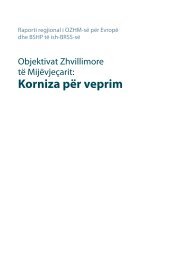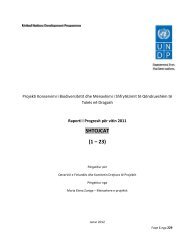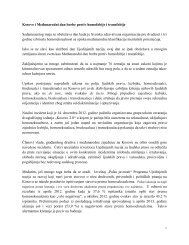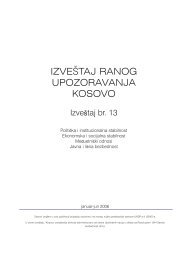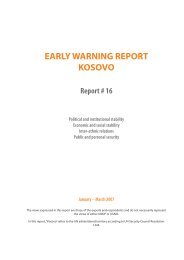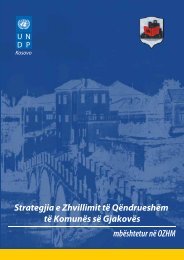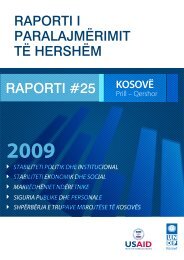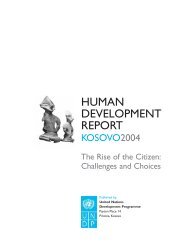Kosovo Human Development Report 2010 - UNDP Kosovo - United ...
Kosovo Human Development Report 2010 - UNDP Kosovo - United ...
Kosovo Human Development Report 2010 - UNDP Kosovo - United ...
You also want an ePaper? Increase the reach of your titles
YUMPU automatically turns print PDFs into web optimized ePapers that Google loves.
construction and neglect and abuse of<br />
natural resources. 138 <strong>Kosovo</strong> also has<br />
the highest incidence of lead contamination<br />
in the world. Outdated<br />
farming techniques and rapid deforestation<br />
for construction purposes<br />
are causing extensive damage to<br />
arable land and <strong>Kosovo</strong>’s vulnerable<br />
forest areas. Industrial pollution in<br />
cities is very high: use of lignite coal<br />
ejects 25 tons of ash into the air every<br />
hour – 74 times higher than European<br />
environmental allowances. 139<br />
Waste management programmes<br />
for industrial waste from major facilities<br />
such as the Trepça Complex are<br />
unable to cope with the sheer volume<br />
of contaminants. Information<br />
systems that might alert communities<br />
and mobilize a response are also<br />
largely absent. As a result, Kosovans<br />
are mostly their own worst enemies<br />
on the environmental front – contributing<br />
to widespread waste, littering<br />
the land and causing health damage<br />
to themselves and their families<br />
through heavy smoking. Those most<br />
vulnerable to health consequences<br />
from <strong>Kosovo</strong>’s environment are the<br />
poor and ill-informed, and women<br />
and children without the influence<br />
and resources to change their environments.<br />
For example, UNICEF estimates<br />
that 60 percent of schools<br />
do not have access to safe drinking<br />
water and rely on water from wells<br />
which is often contaminated - affecting<br />
children’s growth and learning<br />
and contributing to a cycle of exclusion.<br />
140<br />
(vi) Absence of specialist services: for<br />
all but the wealthiest Kosovans, accessing<br />
specialist health represents<br />
an enormous challenge. <strong>Kosovo</strong><br />
lacks specialist cardio-surgery, oncology<br />
and some tertiary treatment<br />
and diagnostics services. Most patients<br />
have to travel outside of <strong>Kosovo</strong>,<br />
mainly to neighboring countries<br />
72 | KOSOVO HUMAN DEVELOPMENT REPORT <strong>2010</strong><br />
such as Macedonia, Serbia, and<br />
even Turkey. Despite the lack of reliable<br />
data in this field, the MOH has<br />
reported spending several million<br />
EUR every year to support treatment<br />
of Kosovans abroad. In <strong>2010</strong><br />
alone, the MOH allocated 2 million<br />
EUR from its budget for this purpose.<br />
141 For the period from January<br />
to June <strong>2010</strong> the MOH received 582<br />
applications for treatment abroad,<br />
out of which 293 were supported<br />
by the MOH and went to treatment,<br />
while others are in the process or on<br />
waiting lists. 142 Funds for treatment<br />
abroad are often exhausted by midyear,<br />
leaving patients unfortunate<br />
enough to fall sick in quarters three<br />
and four without options.<br />
4.3 Who is affected by<br />
healthcare exclusion?<br />
(i) Families unable to afford medical<br />
treatment: a health care seeker in<br />
<strong>Kosovo</strong> today may be asked to find<br />
funds for copayment, prescriptions<br />
and medical devices, diagnostics<br />
and basic health services. Supplementary<br />
costs include travel to<br />
and from health centres, as well as<br />
private, “under the table” payments<br />
for medical staff to facilitate treatment.<br />
In total, these costs add up<br />
to 6 percent of average household<br />
budgets. 143 Several studies indicate<br />
that out of pocket payments for<br />
healthcare in <strong>Kosovo</strong> accounts for<br />
40-60 percent of overall health expenditure.<br />
144 Medicines are by far the<br />
greatest health cost-burden on families<br />
– 80 percent of <strong>Kosovo</strong>’s pharmaceutical<br />
market (40-45 million EUR<br />
each year) is financed through out<br />
of pocket payments. 145 The <strong>UNDP</strong><br />
<strong>Kosovo</strong> Mosaic survey shows that<br />
74.8 percent of Kosovans find the<br />
cost of drugs is the biggest barrier



